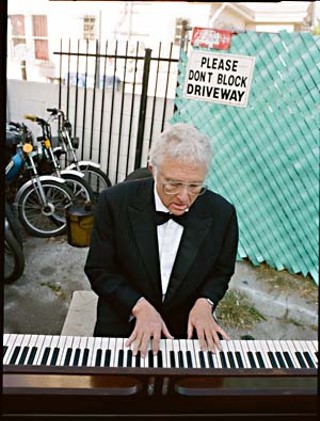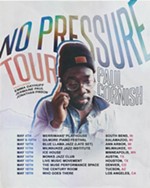They're a Little Odd and Don't Know It
Randy Newman's cast of characters
By Robert Faires, Fri., Sept. 19, 2008

When a twentysomething colleague heard mention of Randy Newman, she cocked her head and asked, "Is he that guy" – and here her voice dropped into a growly approximation of Newman's – "'You've got a friend in me'?"
He is. And for anyone who came of age after 1990, Newman's best known as the guy who wrote songs for all those Pixar movies: "You've Got a Friend in Me" for Toy Story, "When She Loved Me" for Toy Story 2, "Our Town" for Cars, and the Oscar-winning "If I Didn't Have You" from Monsters, Inc.
If you're 10 years older, however, you more likely made a crack about "Short People." After all, the hit single from Newman's 1977 Little Criminals was his only Top 10 showing in a celebrated 48-year career. A hit for all the wrong reasons. Satire's still a tricky concept in mainstream pop culture.
And for those dinosaurs that came of age in the 1970s, Newman's the genius behind a brilliant string of solo albums starting in 1968: Randy Newman, 12 Songs, Sail Away, and Good Old Boys, which yielded such songwriting gems as "I Think It's Going to Rain Today," "Political Science," and "Louisiana 1927," a song that gained a poignant new life after Katrina.
Fans of those early efforts and follow-ups Born Again (1979), Trouble in Paradise (1983), and Land of Dreams (1988) have been starved for Newman solo material over the past two decades. Once Hollywood reveled in his scores for Ragtime, The Natural, and Avalon, among others, he didn't make another album for 11 years, 1999's Bad Love, then took another nine for the new Harps and Angels (see "Phases & Stages," Sept. 12), which provided a welcome excuse for the Chronicle to check in with the one-of-a-kind composer, arranger, and, yes, character.
Randy Newman: I'm happy with the album. The only little crack I notice is that maybe the arrangements get me by in some songs that aren't as good as stuff on, say, Bad Love. Maybe in "Only a Girl" the arrangement and the joke at the end get me through. I wrote it real fast. I mean, it was the day before, and I didn't have it done. Nor did I have "Harps and Angels" done. But "Harps and Angels" I like very much 'cause the acting job is right. I can see that guy really well. And his friends and the angels and the Lord. That's very successful, and that may be partly because of the chart also. It's hard to say now.
Austin Chronicle: The new album has another great cast of characters. Do you feel like the characters you write are all part of the same family?
RN: All part of the same family in the ones that aren't straight love songs. Usually, they're people who lack self-knowledge. They know themselves less well than the audience knows them just by hearing what they say, the misguided things they say. That's basically what they have in common. They're a little odd and almost always don't know it, or they wouldn't be admitting what they're talking about.
AC: Because they're odd, it seems like it would be easy to condescend to them, but you're always very fair to your characters. Is that hard to do?
RN: No. You're not talking about monsters. They do have their good points. There's always something to indicate that they're human. If it isn't there, it doesn't work. It's just mean. Character's really complicated. You don't really get down to it all in a song. You try and do the best you can, cover your subject as well as you can, but you can't get it all.
AC: I hear aspects of the character not just in the lyrics and the music but in the arrangements.
RN: That's what I've tried to do from the very first one I wrote, "Davy the Fat Boy." I always was good at it. That's one thing I can be immodest about. Even at the very beginning, I could write for an orchestra. Like in "Davy" and "Cowboy." I'd make mistakes. "Burn On" is a mistake. I thought the horns would be louder. And they would have been if I'd told them to play louder. But I was stupid. I'm better at it now. If there's one thing that I'm sure I've improved at, it's arrangements. Having to write for an orchestra for six, eight weeks at a time [scoring film], you learn some things inevitably.
AC: You've said that you love being in front of an orchestra more than anything.
RN: Yeah, I do. They're the best audience for me. They like me because it's very different from other sessions. I wouldn't say they love me, but it's a payday that's less unpleasant than most paydays. They know the respect I have for them. They know that I know that I wouldn't be there if I didn't have the stick in my hand and I hadn't written the music, 'cause I can't play at the level that these guys can play. And by guys, I mean women, too. I've just always loved musicians as people somehow. Except for trumpet players.
AC: There's something so, for lack of a better word, American sounding in your music. Were you mainlining Stephen Foster and Aaron Copland and George Gershwin when you were a kid? It seems to be in your bloodstream.
RN: I did know the repertory. As does Carole King. I mean, you can hear it in her songs. She knows those changes. She goes to her own places, rock & roll ones, but you can tell she knew all that stuff. The best writers early on retained some of that harmonic structure of those old songs. [Paul] McCartney did, of course. But as Gershwin and [Harold] Arlen did, I have a predilection for the blues as the basis for things, whereas [Richard] Rodgers didn't. Jerome Kern a little more. Cole Porter didn't, though he did it a couple of times. Some people write that way, some people don't.
AC: Who do you feel like you learned the most from, in terms of songwriting?
RN: I don't know. [Warner Bros. executive] Lenny Waronker was into music before I was, so he kinda pushed me into trying to write songs. And he started to work at a publishing company, and he knew, out of all the music, who was doing the best stuff. You know, [Barry] Mann and [Cynthia] Weil, [Gerry] Goffin and King. In some ways, Carole King must have had an influence on me, because I liked her stuff so much. Certainly Ray Charles, not as a songwriter but with those whole records. I never was what I'd call a music lover, where I'd buy a lot of pop records, but I bought The Genius of Ray Charles and Dedicated to You and The Genius Hits the Road. I knew those, and maybe that's in my head somewhere. But it's hard to say, you know. If I could write "Bess, You Is My Woman Now," maybe I would. I couldn't sing it, though. Maybe I could approach that for somebody else, but I wouldn't write it for myself.
Since I assume a lot of singer-songwriters will read this: You have to separate yourself. Something that you would be writing for Faith Hill, you can't necessarily write for yourself. I never saw myself as a romantic hero, though I could've. Billy Joel kind of did. You know, Billy Joel gets maligned so exorbitantly that it surprises me, because he's done some really good stuff. These people that dislike him don't know him. They don't have that excuse. He gets voted the worst rock & roller. He's hardly the worst rock & roller. He can play; he can sing; he can rock & roll.
AC: There's some of your work that I'm particularly fond of that's less well-known, things like the songs for the animated film Cats Don't Dance or the musical Faust. Are there songs that you wish were a little more on people's radar?
RN: Yeah, the song for Babe: Pig in the City that I wrote for [Peter] Gabriel. And maybe the best song that I ever wrote in some ways is "Relax, Enjoy Yourself" from Faust. Finally, the devil wins one over the Lord, at least rhetorically. It's got the girl; it's got a load of important stuff in it. There's stuff on Faust that was better than it was noted as being, but what can you say?










